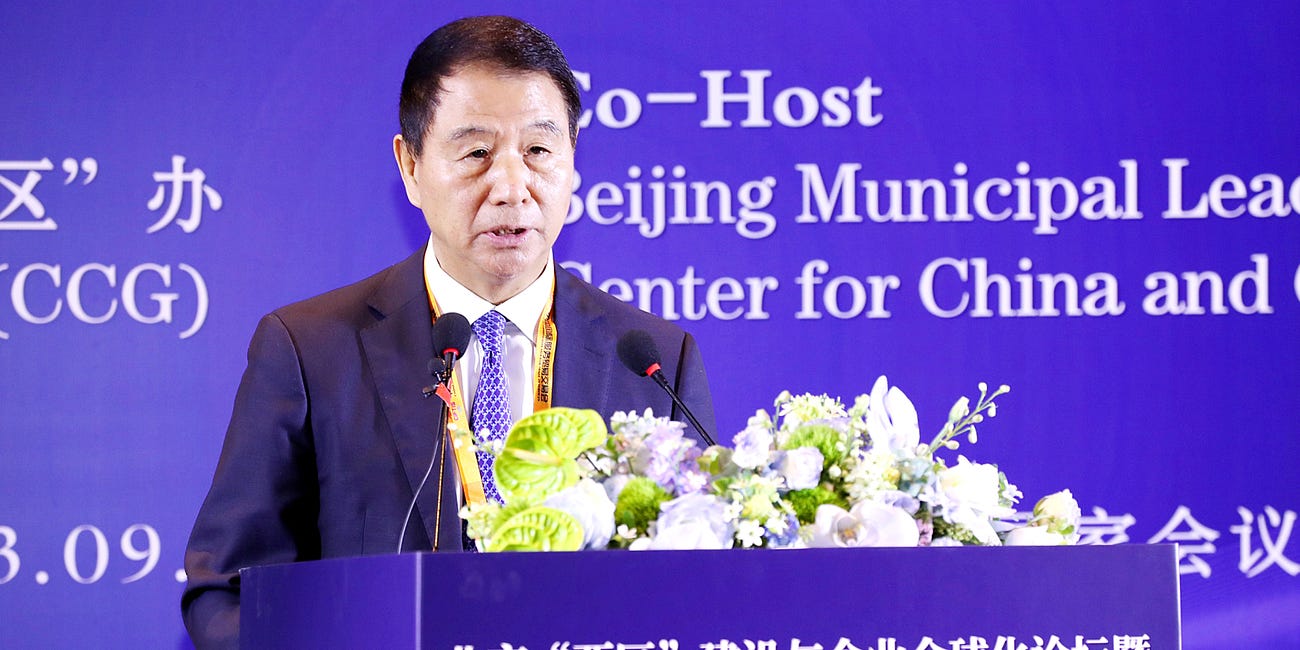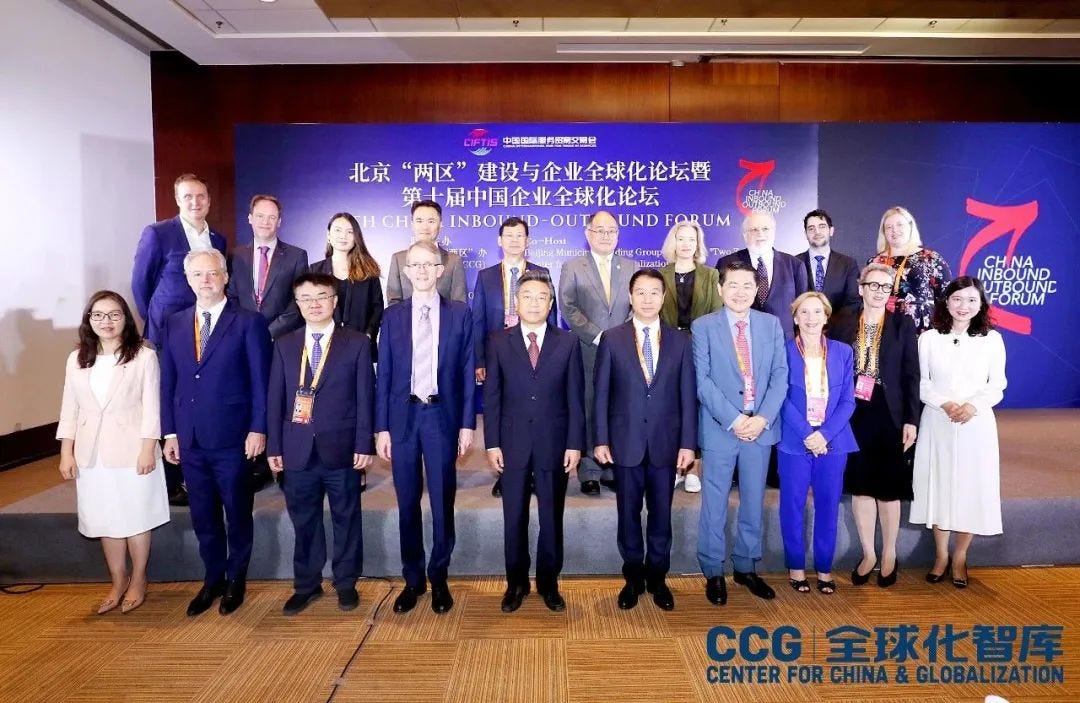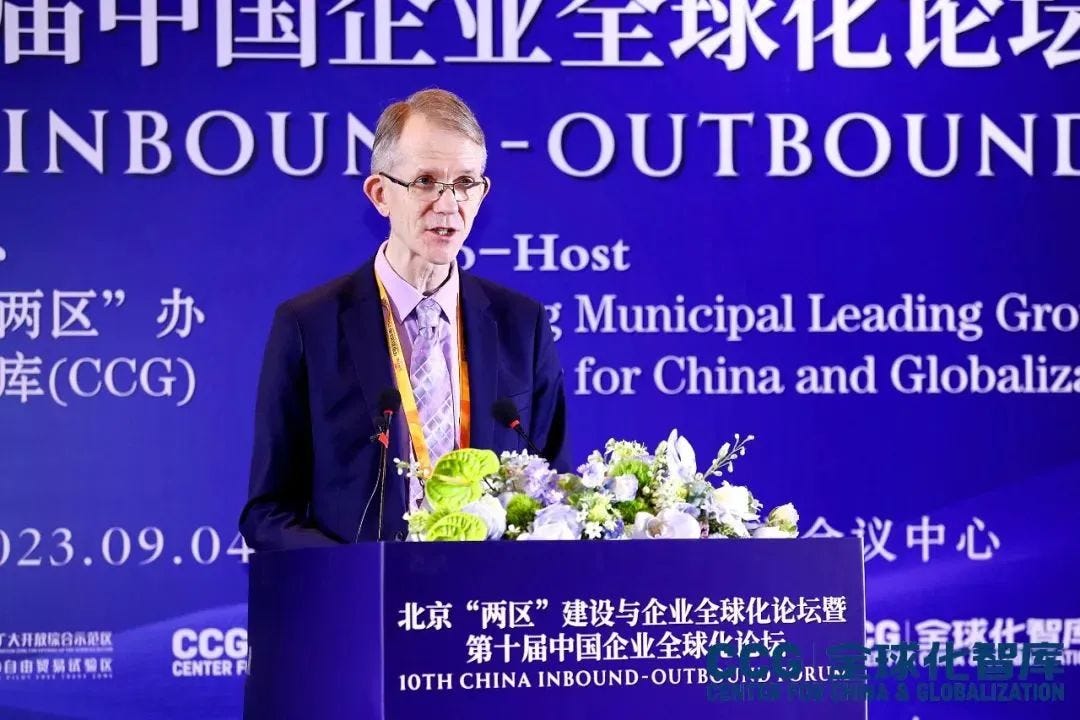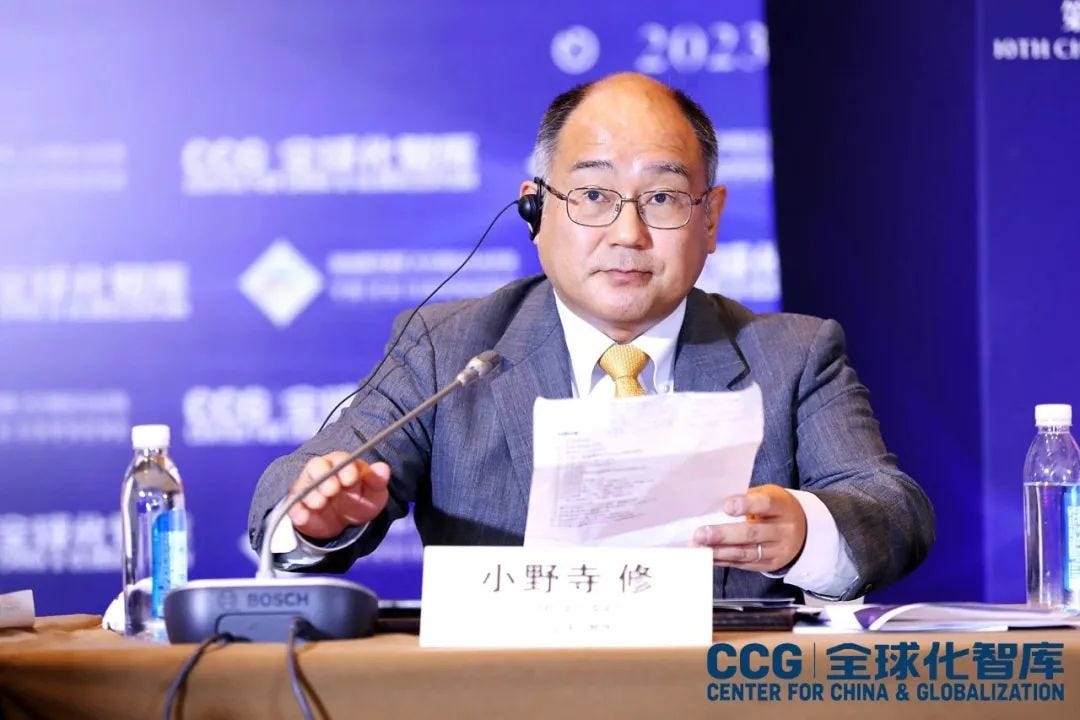Australian, British, and Japanese speeches at recent CCG event
Australian Ambassador to China, Deputy Head at British Embassy, and Beijing representative of Japan External Trade Organization advocate trade at CCG's Inbound-Outbound Forum
Graham Fletcher, Australian Ambassador to China, Geraldine McCafferty, Deputy Head of Mission of the British Embassy in Beijing, and Osamu Onodera, Director-General of the Beijing Office and Chief Representative of North East Asia for the Japan External Trade Organization (JETRO), on Monday, September 4, spoke at the 10th China Inbound-Outbound Forum as a part of the 2023 China International Fair for Trade in Services (CIFTIS).
The Forum is co-hosted by CCG and Beijing Municipal Leading Group Office for “Two Zones,” referring to the national integrated demonstration zone for greater openness in the services sector and the pilot free trade zone characterized by scientific and technological innovation in Beijing.
Speakers at the opening session of the Forum also include Yi Xiaozhun, China’s former Vice Commerce Minister; Yong Ding, Director of Beijing Municipal Commerce Bureau; Henry Huiyao Wang, Founder and President of CCG; Junshu Yong, Vice Chairman of the Standing Committee of Beijing Municipal People's Congress; and Tamas Hajba, Senior Advisor for China and Head of the OECD Beijing Office.
Graham Fletcher says security interests should not hinder investment and trade. He didn’t name names, but the backdrop is apparently China’s trade curbs on Australian exports in recent years, many of which have been lifted. He notes the significant decline in Australian direct investment in China and calls for cooperation in the face of geopolitical tensions in areas such as decarbonization, digital trade, and services trade.
Geraldine McCafferty emphasizes that the UK does not subscribe to “de-coupling” despite acknowledging the growing risks associated with global trade. She said that the UK’s National Security and Investment Act 2021 is not specifically aimed at China, but applies uniformly regardless of the country of origin. Furthermore, she highlights the considerable potential for cooperation between China and the UK, particularly in the fields of services and education.
Osamu Onodera urges fair competition, market openness and transparency, and facilitation for Japanese businesses in China. He also notes specific concerns related to data regulations, visa requirements, and tax issues and highlights the need to address reduced interaction between China and other countries due to COVID-19.
The opening session was broadcast in China on various social media channels by CCG. Chinese and international media reporters were invited.
This post hasn’t been reviewed by the speakers and all emphasis below are ours - Yuxuan Jia and Zichen Wang.
Graham Fletcher, Australian Ambassador to China
It is appropriate that today, at the first in-person China Inbound-Outbound Forum since the pandemic, we can reflect on the importance and future of investment and trade in services.
As economies bounce back from the pandemic, investment and trade are essential for economic recovery and growth. Trade in services in particular is a driver of economic growth. According to the World Trade Organisation, the global value of services trade increased 15 percent in 2022 to $6.8 trillion USD.
While the pandemic disrupted investment and trade in services, it also resulted in significant innovation and change in the delivery of services. Today the global economy is more connected and integrated than at any point in history.
Digital technology and innovation are helping companies access new data to inform investment decisions, driving the rapid growth of e-commerce, improving business productivity, and supporting the creation of new products and services. While this innovation brings new economic opportunities, it also brings new challenges.
Investment and trade flows are also increasingly influenced and affected by geopolitical tensions. These tensions are apparent in greater competition to secure key technologies and supply chains, concerns over dual-use technologies, and government actions to manage emerging security risks. Governments need to find a balance between protecting national interests while still encouraging productive trade and investment. It is crucial that in pursuing their security interests, countries do not unnecessarily restrict investment and trade.
Overlaying all of these considerations is increased attention to the crisis of climate change. Climate change means we need to cooperate to ensure trade and investment flows support decarbonisation efforts to meet our net zero targets.
Taken together the challenges are large, but they are also shared. The scale of these challenges is a good reminder of how stable and productive international dialogue is vital, as we all seek to navigate shared challenges, and find solutions according to our national interests.
Australia values the stable flow and growth of investment and trade. We are an open, trading nation whose economic growth, like China, is powered by investment. Last year trade made up over 40 percent of our GDP and Australia was in the top 10 largest destinations for global foreign direct investment.
Australia is working hard to bolster and support stable trade and investment flows. Our trade agreements, and our participation and support for key international and regional economic forums is: addressing trade impediments; increasing predictability for businesses; creating quality jobs and providing consumers with more choice.
More than anything, removing trade impediments and ensuring predictability for business are essential to the growth of trade and investment. This is why Australia attaches such great value on the international rules-based trading system.
Australia and China both have a shared interest in supporting and sustaining this system. It is the international rules-based trading system that has underpinned the historical success of our countries and our region in attracting investment and supporting trade flows.
Australia and China are both important investment and trade partners. While merchandise trade continues to be the foundation of our economic relationship, trade in services is a driver of growth. Last year, while overall trade grew 6 percent, services trade between Australia and China grew 10 percent, and China was the second largest market for Australian services exports. However, there is scope for improvement. Services trade still only makes up 4 percent of our total trade.
Investment flows between Australia and China also face challenges. Last year, while Chinese direct investment in Australia was stable at around 45 billion AUD, Australian direct investment in China fell 24 percent to 4 billion AUD.
It is clear that China is managing growing economic and international headwinds as it seeks to recover from the pandemic. It is important, as economic partners, we consider the opportunities available to us to support our prosperity.
A multi-faceted approach to cooperation on investment and trade will help support a productive economic relationship as we each seek to strengthen our economies in the face of shared challenges.
Decarbonisation and the green energy transition provides a positive platform for engagement. Our vision is for Australia to become a clean energy superpower. The Australian Government has set a target to reduce our greenhouse gas emissions by 43 per cent below 2005 levels by 2030. This will put us on track to achieve zero emissions by 2050. But, as our Trade Minister has said, this will require huge investment. China has also set its own historic carbon peaking and neutrality targets.
So, It is clear we are both on a journey towards a low-carbon future. Australia sees opportunities in three areas: progress in clean power generation together with upgrades of supporting infrastructure, low carbon industrial processes, and new energy and green resources innovation and development, with a view to investment and commercialisation.
Supporting digitisation and creating global digital trade rules is another avenue for cooperation. Digital trade rules provide certainty to business, boost economic resilience, and build trust in the online environment, and importantly, promote interoperable systems across borders which facilitate trade and avoid protectionism.
Working together on robust and carefully calibrated digital trade rules can unlock the full benefits of the digital economy and boost our investment and trade ties. For example, China’s focus on digital education through the pandemic supported Australia’s education sector to grow through the use of online education delivery. This was to the benefit of Chinese students who continued to receive a high-quality education through an accredited Australian provider. And This is one area where we can continue to work together and innovate.
As Australia and China continue to stabilise our relationship, these economic issues provide a platform for us to grow our investment and services trade. Through sustained and constructive dialogue, including at forums like this, we can take advantage of the opportunities ahead of us, and support the economic growth and prosperity of two our countries and region.
Geraldine McCafferty, Deputy Head of Mission, British Embassy Beijing
Honoured attendees, I am pleased to be here today at CCG's Inbound-Outbound Forum – this year is especially important to us, because the UK has the privilege of being Country of Honour at CIFTIS. We are delighted that Lord Johnson, the Minister for Investment, is here in Beijing to attend in person. This is the UK’s largest business delegation to China in four years, and more than 60 UK companies and organisations will participate in policy dialogues with Chinese partners.
CIFTIS presents us with the opportunity to act on the ambition set out in the Integrated Review Refresh and the Foreign Secretary’s Mansion House speech to deepening our trade relationship as we believe a positive trade relationship brings benefit to both our countries.
The Foreign Secretary was in Beijing last week, re-establishing direct lines of communication between our countries. Of course, as he told his counterparts, there are areas where we disagree which we need to talk about directly and unambiguously. There are also opportunities to work together in both countries’ interests. In that spirit, I will say a few words on both in the context of our trading relationship.
I would like to first discuss a few of the key areas where the UK and China can cooperate on trade and investment.
China is already the UK’s 4th largest trading partner, with bilateral trade worth over £100bn last year. The UK is a services powerhouse, making up 79% of total UK economic output, but trade in services are underrepresented in our trading relationship. As such, I firmly believe there are many more mutually beneficial opportunities in the services sector.
Education is one such sector. Last year we welcomed over 140,000 Chinese students, from all ages to study in the UK. Indeed, this week many British schools have signed Memoranda of Understanding to help expand their collaboration with Chinese institutions. I am delighted that the UK can play a positive role in supporting China’s education needs.
Multilateral trade is another area where the UK and China can work together. We share a commitment to the multilateral trading system and ensuring a level playing field. I look forward to working together with China to protect and reform this on the global stage.
But there are also some challenges stemming from trade. The UK does not believe in the narrative of ‘de-coupling’ – we think that trade is a good thing. However, across the world, more and more countries and governments are paying attention to risks that increased trade can bring. The UK and China are no exception to this.
The UK is taking a proportionate and targeted approach towards managing these risks. For example, in 2021, we introduced our National Security and Investment Act. The NSI Act maintains the UK’s status as an open and attractive place to invest, and our notification regime gives clear direction on where our security interests lie. The annual report demonstrates we have used this power in a tight and proportionate manner – the UK government only used the powers in the NSI Act 8 times in relation to China and Hong Kong, and in the majority of these cases, the transaction was able to proceed with conditions. There is a perception among some which I would like to address: China is not the target of this legislation; it applies equally regardless of the country of origin of the investor involved.
Let me finish by saying again that we do not want these concerns to act as a barrier towards growing our trade and investment relationship. China is an ever-expanding market and international business can play an important role in supporting China’s economic objectives. The more we reform and open up our economies, the better it is for global prosperity.
Thank you to the Beijing City government for organising this event, and thank you to the Centre for China and Globalisation for inviting me to speak. I look forward to many more chances for the UK and China to build on our successful trade and investment relationship.
Osamu Onodera, Director-General of the Beijing Office and Chief Representative of North East Asia for the Japan External Trade Organization (JETRO)
Thank you to Mr. [Henry Huiyao] Wang and CCG for this opportunity to join in important discussions.
JETRO is a government related organization with mission to promote global trade and investment, thereby contribute to development and innovation. Thank you for the explanation on the 2 zones initiative. This and 24 points issued by the State Council recently are good signs for foreign enterprises if implemented judiciously taking into account the voice of foreign businesses. We look forward to ongoing discussions.
In terms of what can be done better, Japanese Chamber of Commerce in China publishes an annual white paper and focuses on three plus three points. One, fair competition in various areas including government procurement (including medical equipment), standards, intellectual property among others. Second is market openness. Third, is the importance of transparency and facilitation. Changes in regulations may be necessary to respond to changing global and technological environment but implementation regulations need to be clear and announced sufficiently in advance so private sector can suggest changes and meet regulatory requirements. Transparency and predictability is key.
On specific issues, data regulations, visa requirements, and tax related issues are three issues that are highlighted. I note that there have been recent developments related tax issues which show that Chinese government is taking into account the voice of foreign business which is appreciated. I wanted to touch on one issue which was highlighted in one of the meetings between Chinese authorities and foreign companies. This is the reduced interaction between China and other countries (partly due to COVID). As Ambassador Yi stated, there is a big reduction in number of travelers and ex-pats(business, tourists). This has given rise to increased gap in perception towards each other. There may be a need on both sides to work on this issue.
Finally, JETRO has participated in the CIFTIS (China International Fair for Trade in Services) since 2012. This year we have a Japan Pavilion with 34 companies with the theme of “integration of online and offline services”. Panasonic and other Japanese companies are also participating and I hope you can take a look.
CCG Update has already published the speech by Yi Xiaozhun, China’s former Vice Commerce Minister and former Deputy Director-General of the WTO, at the same event:
See also:











